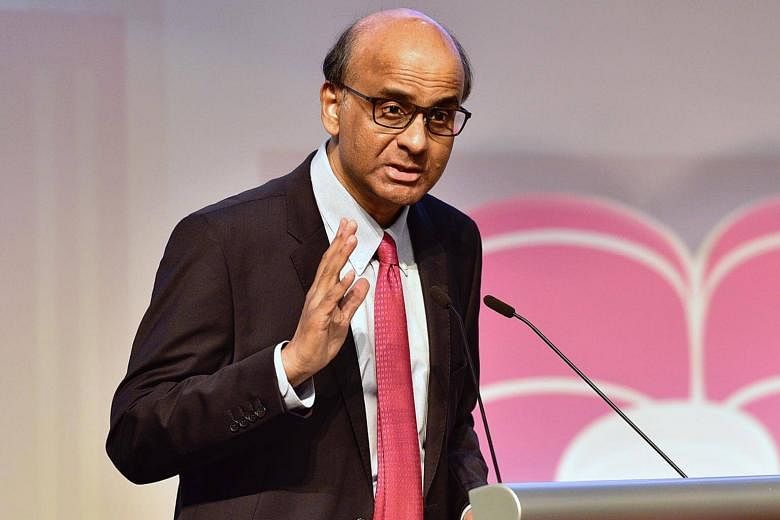BEIJING - The most important global development in the past three decades has been China joining the global economy and that "story is far from over", Deputy Prime Minister Tharman Shanmugaratnam told a high-level forum in Beijing on Saturday (March 23).
China's productivity today is just one-third that of the United States and vast potential remains for its economy to grow, income levels to rise and skills to be honed.
And as the world becomes more multipolar and interconnected, a new cooperative international order will have to be forged to deal with the most pressing problems: 1.1 billion people under the age of 15 in the developing world who need the skills to deal with the disruptions that technology has brought on global value chains; a world ill-prepared to deal with global crises such as climate change; and an international monetary system that does not reliably support emerging economies.
The solution is to reform global financial governance which currently "lacks coherence", said Mr Tharman, who chairs the G-20 Eminent Persons Group which released a report on proposed reforms last October.
"We cannot return to the old multilateralism. There is no single conductor. And we have several orchestras now. We need a new harmony. But you only get a new harmony if everyone is playing from the same music score," said Mr Tharman, who is also Coordinating Minister for Economic and Social Policies and chairman of the Monetary Authority of Singapore.
He was speaking on a panel on the future of the global financial architecture at the China Development Forum, which gathers the world's top business leaders and economists in Beijing annually to meet with Chinese government officials, fellow CEOs and academics.
A new, cooperative international order will have to emerge, and it will require a new relationship between the United States, China and other leading powers, said Mr Tharman; one which "involves a sharing of responsibilities and an updating of rules that enables China to take greater responsibility in maintaining an open world order".
In an earlier session, Apple CEO Tim Cook urged China to continue to open up.
"We see that as essential. Not only for China to reach its full potential but for the global economy to thrive," he said.
Seasoned China watchers warned at a separate session that Washington is increasingly pursuing a path of competition with China which could undo the decades of goodwill that had been built on both sides.
"It (competition) is the watchword currently," former Assistant Secretary of State for East Asian and Pacific Affairs Kurt Campbell said.
"For two robust economies, it's remarkable how few habits of cooperation we have. Competition simply will not sustain us going forward."
Yale University senior fellow Stephen Roach believes the ongoing US-China trade talks will likely result next month in a "superficial deal" where China promises to buy more goods from the US.
"That leaves us with a distinct possibility that there will be a lingering conflict that has been described as an economic Cold War."
Dr Roach argues that to resolve tensions, there should be a bilateral investment treaty which will eliminate foreign ownership caps and address issues of forced technology transfer. The two countries also need to rebalance their economic systems, and adopt a proactive rather than reactive engagement policy.
At the same session, the head of China's securities regulatory body Fang Xinghai said China is fully committed to opening up.
"If you complain that we open up too slowly, we can speed it up," he said.


